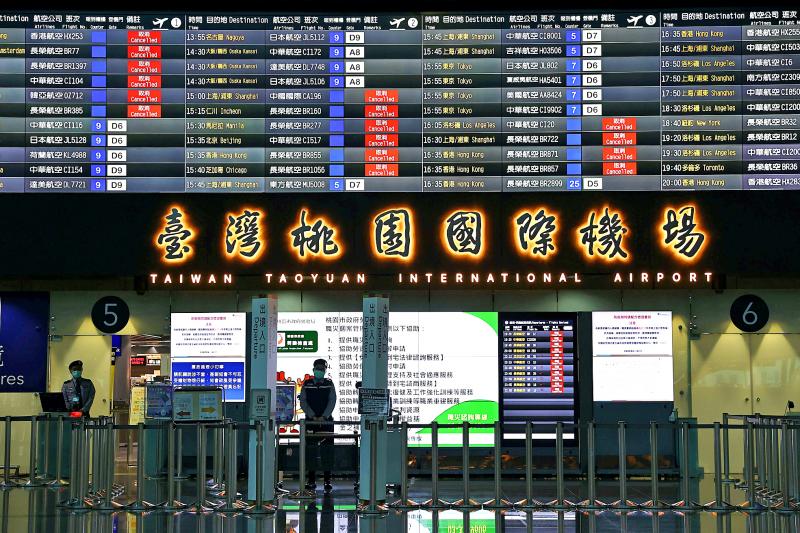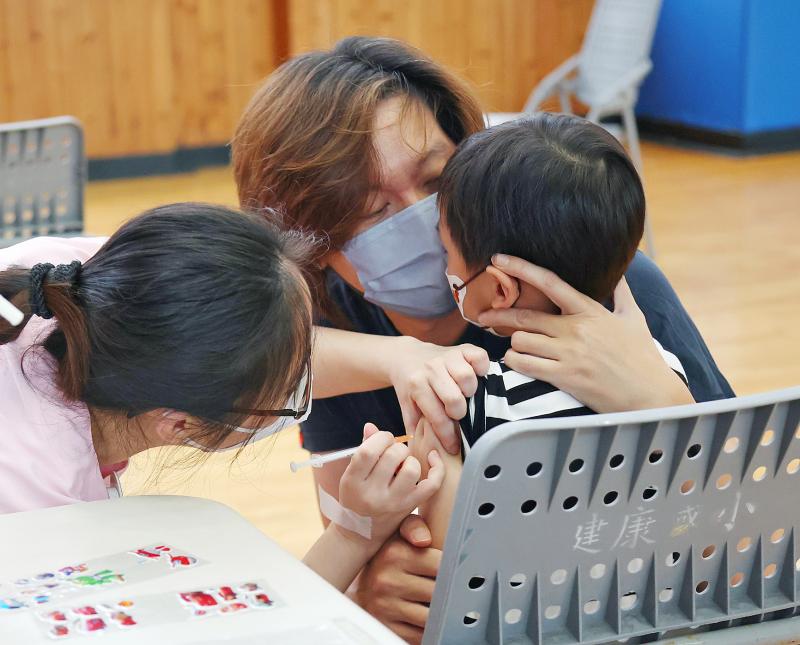The Central Epidemic Command Center (CECC) yesterday said a policy for reopening national borders to business travelers was being discussed with the Ministry of Economic Affairs and “would be announced soon.”
Minister of Health and Welfare Chen Shih-chung (陳時中), who heads the center, said that the COVID-19 infection rate in Taiwan has increased to about 6 percent, which is about the same as the positivity rate detected among inbound travelers.
The tight border control measures imposed since the COVID-19 pandemic began had aimed to keep the virus out, but as the infection rate has increased, stopping the virus at the border is no longer a main concern, he said.

Photo: Reuters
The main concern that would affect border reopening plans for next month would be healthcare capacity, as healthcare providers are still under pressure due to the local outbreak, he said.
However, for the first time since last month, the number of COVID-19 cases discharged from hospitals exceeded the number of COVID-19 cases admitted to hospitals on Friday, Chen said, adding that it is like “seeing the light at the end of the tunnel” regarding the reopening of national borders.
As many countries are reopening to restore economic stability, and Taiwan has lost out on many international investment and business opportunities during the pandemic, the policy for reopening to business travelers would be announced soon, he said.

Photo: CNA
Centers for Disease Control (CDC) Director-General Chou Jih-haw (周志浩), head of the CECC’s disease surveillance division, said 80,835 local cases, 46 imported cases and 127 deaths were confirmed yesterday.
Chen said 10,066 courses of the oral antiviral Paxlovid and 1,351 courses of molnupiravir were prescribed on Friday, a significant increase from previous days.
Based on Friday’s daily case count, approximately 14 percent of confirmed cases have received oral antiviral drugs, he said.
Addressing concerns that Taiwan does not have enough antivirals to treat people with COVID-19, Chen said 59,797 courses of Paxlovid have been prescribed, 657,393 have been stockpiled and 2,810 have yet to be delivered, while 14,611 courses of molnupiravir have been prescribed, 91,229 have been stockpiled and a new contract has been signed to procure 201,600 courses.
If about 15 percent of cases are eligible for antivirals, the procured drugs would cover another 5 million confirmed cases, he said.
CDC Deputy Director-General Philip Lo (羅一鈞), deputy head of the CECC’s medical response division, said that 4,439 moderate or severe cases, including 1,058 deaths, have been reported so far this year.
As of Friday, the rate of severe cases had increased to about 0.08 percent, he said.
Of the 127 deaths confirmed yesterday, 119 people had underlying health conditions, 48 were unvaccinated and 74 people did not receive a booster shot, the center’s data showed.
Two young children died, one of whom was a six-year-old boy who was originally suspected of having encephalitis, but was later found to have a malignant tumor in his cerebellum, Lo said, adding that he died of a brain tumor and neurogenic shock.
The other was a five-year-old boy who had a muscular disease and died of pneumonia and respiratory failure, he said.
Pediatric Infectious Diseases Society of Taiwan chairperson Chiu Nan-chang (邱南昌) said there could be four reasons COVID-19 affects the brain, the main one being a “cytokine storm” induced by the virus, which is a hyperactive immune response that can harm the nervous system and organ tissues.
While the reasons are being studied, the most important things people should look out for in children are early signs of severe illness and encephalitis, he said.
Although the rate of severe cases among children with COVID-19 is low, parents should try to keep their children safe and consider getting them vaccinated if they are five or older, because it is hard to predict how they will react to the disease, Chiu said.

AIR SUPPORT: The Ministry of National Defense thanked the US for the delivery, adding that it was an indicator of the White House’s commitment to the Taiwan Relations Act Deputy Minister of National Defense Po Horng-huei (柏鴻輝) and Representative to the US Alexander Yui on Friday attended a delivery ceremony for the first of Taiwan’s long-awaited 66 F-16C/D Block 70 jets at a Lockheed Martin Corp factory in Greenville, South Carolina. “We are so proud to be the global home of the F-16 and to support Taiwan’s air defense capabilities,” US Representative William Timmons wrote on X, alongside a photograph of Taiwanese and US officials at the event. The F-16C/D Block 70 jets Taiwan ordered have the same capabilities as aircraft that had been upgraded to F-16Vs. The batch of Lockheed Martin

GRIDLOCK: The National Fire Agency’s Special Search and Rescue team is on standby to travel to the countries to help out with the rescue effort A powerful earthquake rocked Myanmar and neighboring Thailand yesterday, killing at least three people in Bangkok and burying dozens when a high-rise building under construction collapsed. Footage shared on social media from Myanmar’s second-largest city showed widespread destruction, raising fears that many were trapped under the rubble or killed. The magnitude 7.7 earthquake, with an epicenter near Mandalay in Myanmar, struck at midday and was followed by a strong magnitude 6.4 aftershock. The extent of death, injury and destruction — especially in Myanmar, which is embroiled in a civil war and where information is tightly controlled at the best of times —

China's military today said it began joint army, navy and rocket force exercises around Taiwan to "serve as a stern warning and powerful deterrent against Taiwanese independence," calling President William Lai (賴清德) a "parasite." The exercises come after Lai called Beijing a "foreign hostile force" last month. More than 10 Chinese military ships approached close to Taiwan's 24 nautical mile (44.4km) contiguous zone this morning and Taiwan sent its own warships to respond, two senior Taiwanese officials said. Taiwan has not yet detected any live fire by the Chinese military so far, one of the officials said. The drills took place after US Secretary

THUGGISH BEHAVIOR: Encouraging people to report independence supporters is another intimidation tactic that threatens cross-strait peace, the state department said China setting up an online system for reporting “Taiwanese independence” advocates is an “irresponsible and reprehensible” act, a US government spokesperson said on Friday. “China’s call for private individuals to report on alleged ‘persecution or suppression’ by supposed ‘Taiwan independence henchmen and accomplices’ is irresponsible and reprehensible,” an unnamed US Department of State spokesperson told the Central News Agency in an e-mail. The move is part of Beijing’s “intimidation campaign” against Taiwan and its supporters, and is “threatening free speech around the world, destabilizing the Indo-Pacific region, and deliberately eroding the cross-strait status quo,” the spokesperson said. The Chinese Communist Party’s “threats